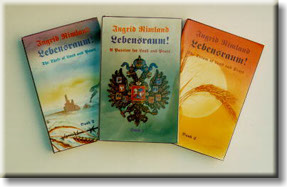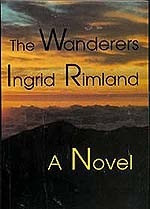

To order The Wanderers,
please click here
Background to
"The Wanderers"
Now that I have launched my "triplets", "Lebensraum!", I look at my first "literary baby" a bit askance, thinking what an inexperienced "parent" I was when I first had this title published. How little did I know!
I must admit up-front that I am a bit apologetic about this book. The truth is that I was grass-green when I first wrote it and succeeded in having it published - and even though the title was published to much literary acclaim, I now know that I will come across as a much stronger writer in my new venture, "Lebensraum!"
I started speaking English in 1967. When I wrote "The Wanderers", my English was less than 10 years old. The book was published first in hard cover in 1977 by Concordia Publishing House and re-published by Bantam Books in 1978 in a mass market paperback edition.
Here is the story of "The Wanderers":
As part of my inner awakening in 1967 when I first walked into Wichita State University at age 31 and asked to be "educated", I discovered part of my own heritage by discovering the Mennonite Archives at Bethel College, less than an hour's drive from where we had moved to place my then eight-year-old, Erwin, in a private school for the handicapped.
It was a very painful time for me. I felt awkward and alone, adrift in a "civilized world" after my rather culturally sheltered ethnic existence among the Mennonites. I was trying to heal myself by trying to understand what had happened to me and my child. I needed to understand the forces that had caused this tragedy, and even then I dimly understood that they were vast historical forces.
I started reading ancient documents and started taking notes. I did not know these notes would grow into a novel.
I wrote four sample chapters by hand, mimeographed them on one of those old, ink-stained mimeograph gadgets-remember, this was prior to the widespread use of clean copy machines!-and started circulating them by mailing them to publishers. As I remember it, I got myself a list of publishers, starting with "A" and getting no farther than "C".
Of the ten publishers I approached, three expressed interest in what I was trying to do-and one, Concordia Publishing House in St. Louis, wrote me a rather flattering letter stating that I reminded them of Conrad. Well, that is all it took! I was immensely flattered!
We started corresponding, and I received some editorial advice from Jaroslav Vajda, then executive editor of this rather large and very fundamentalist publishing house. Jary came to see me several times, and we became good friends.
My family and I moved to California in 1971, and two years later my marriage dissolved and I placed Erwin in an institution. I will not repeat the story here-for it is one of tears and pain I later tried to summarize and shed in my next title, the 1984 autobiography, "The Furies and the Flame".
Let me just say that in the wake of my having "lost" both husband and child, as I perceived it then, I rented a small apartment with not a stitch of furniture, sat down in the middle of the floor on the carpet and surrounded myself with my handwritten manuscript, resolved it would become a novel that would launch me as a writer and outdo every other novel of its kind on earth.
I had nothing but 73 cents and only a part-time job that barely covered my expenses. I did not even have a typewriter, much less a computer in those years. I did have Ruth, my then volunteer typist who later on became my secretary when I achieved a doctorate. (Ruth is still helping me with "Lebensraum!", although she lives in Central California and she "commutes" by telephone and mail . . . )
"The Wanderers" was brought out as the Concordia lead title for 1977 and caused quite a stir at the American Booksellers Convention. It was sold to Bantam Books shortly thereafter for what was then a princely sum, $25,000, of which Concordia took half, to my dismay and shock. In the flush of having become a bona fide author, of course I hadn't bothered to read the fine print. What first-time author does?
Nonetheless, now I was a "celebrity" of sorts-the flowers and telegrams started arriving, and shortly thereafter the Commonwealth Club of San Francisco, which is as elegant as you can get here on the Coast, awarded me the highest literary award for that year, ". . . best first novel by a California writer for 1977."
It was a spectacular luncheon, and Alex Haley was my guest speaker. He was flown in at my request-which tells you where my mindset was in those years. All I knew was that he had written a Roots-type novel, which was my goal as well.
I didn't think "The Wanderers" was "it". I had another book inside me.
We talked a bit afterwards, and I bet Alex Haley on that day that I would outshine his novel. We joked about the fact that a black Roots-type novel had beaten a white one to the finishing line-and in the years to come, when I was on the lecture circuit, as Haley was, we would renew and toast our bet each time we crossed each other's path. I must admit in those years I did not perceive or appreciate the irony of a black ethnic novel sweeping America before a white ethnic novel. I genuinely admired him-and, frankly, do so to this day.
However, even in those early years, the seed of "Lebensraum!" already started sprouting in the initial success of "The Wanderers". I knew that there would be a follow-up. I did not know that it would take me 20 years.
After "The Wanderers" ran its course with Concordia and Bantam Books, I took my rights back from both publishing houses and revised and republished the title in 1988. I did it on a tiny MacPlus with an itsy-bitsy screen. I chose the wrong fonts-which pains me to this day. I had it printed up in Hong Kong and started selling it out of my trunk for many years thereafter while I was on the road.
Now that I am flush with the glory of a much better novel, "Lebensraum!" let me confess I feel a bit apologetic about pitching "The Wanderers" before my newest book comes out. I know it has flaws-flaws grammatically, in sentence structure and in spelling. Now I think the storyline is too simple. Now I think that the characters are a bit stiff. But then I didn't think so-after all, on the West Coast, who had a better book?
Here in America, as far as I know, this was the first book ever of its kind that showed the German soldiers as heroes and not villains and which, despite its being so utterly politically incorrect, still won a lot of acclaim and a fair share of awards.
You may still purchase it. I still have some 500 Hong Kong copies left, and I doubt there will be a reprint.
.jpg)
